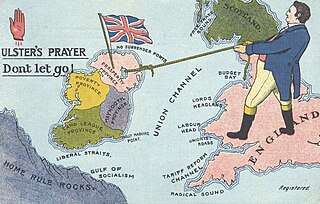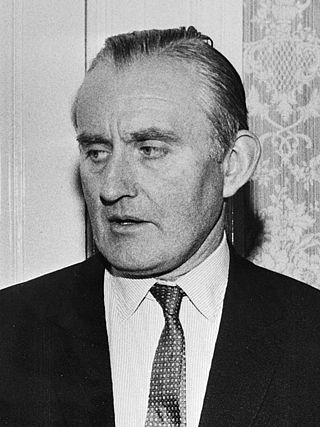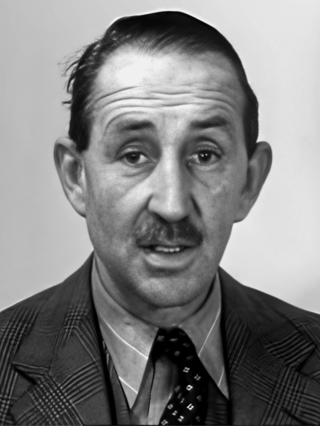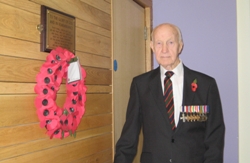Related Research Articles

The Ulster Unionist Party (UUP) is a unionist political party in Northern Ireland. The party was founded as the Ulster Unionist Council in 1905, emerging from the Irish Unionist Alliance in Ulster. Under Edward Carson, it led unionist opposition to the Irish Home Rule movement. Following the partition of Ireland, it was the governing party of Northern Ireland between 1921 and 1972. It was supported by most unionist voters throughout the conflict known as the Troubles, during which time it was often referred to as the Official Unionist Party (OUP).

Unionism in Ireland is a political tradition that favouring union with Great Britain professes loyalty to the crown and constitution of the United Kingdom. The overwhelming sentiment of Ireland's Protestant minority, unionism mobilised in the decades following Catholic Emancipation in 1829 to oppose restoration of a separate Irish parliament. Since Partition in 1921, as Ulster unionism its goal has been to retain Northern Ireland as a devolved region within the United Kingdom and to resist the prospect of an all-Ireland republic. Within the framework of the 1998 Belfast Agreement, which concluded three decades of political violence, unionists have shared office with Irish nationalists in a reformed Northern Ireland legislature and executive. Currently, they are refusing cooperation in this consociational arrangement to protest what they see as an attempt, post-Brexit, to distance Northern Ireland from Great Britain through European Union compliant trade rules.

Terence Marne O'Neill, Baron O'Neill of the Maine, PC (NI), was the fourth prime minister of Northern Ireland and leader (1963–1969) of the Ulster Unionist Party (UUP). A moderate unionist, who sought to reconcile the sectarian divisions in Northern Ireland society, he was a member of the Parliament of Northern Ireland for the Bannside constituency from 1946 until his resignation in January 1970; his successor in the House of Commons of Northern Ireland was Ian Paisley, while control of the UUP also passed to more hard-line elements.
Arthur Brian Deane Faulkner, Baron Faulkner of Downpatrick,, was the sixth and last Prime Minister of Northern Ireland, from March 1971 until his resignation in March 1972. He was also the chief executive of the short-lived Northern Ireland Executive during the first half of 1974.

James Dawson Chichester-Clark, Baron Moyola, PC, DL was the penultimate Prime Minister of Northern Ireland and eighth leader of the Ulster Unionist Party between 1969 and March 1971. He was Member of the Northern Ireland Parliament for South Londonderry for 12 years, beginning at the by-election to replace his grandmother, Dame Dehra Parker in 1960. He stopped being an MP when the Stormont Parliament was suspended and subsequently abolished with the introduction of Direct Rule by the British Government.

Basil Stanlake Brooke, 1st Viscount Brookeborough,, styled Sir Basil Brooke, 5th Baronet, between 1907 and 1952, and commonly referred to as LordBrookeborough, was an Ulster Unionist Party (UUP) politician who served as the third Prime Minister of Northern Ireland from May 1943, until March 1963.
The Protestant Unionist Party (PUP) was a unionist political party operating in Northern Ireland from 1966 to 1971. It was the forerunner of the Democratic Unionist Party (DUP) and emerged from the Ulster Protestant Action (UPA) movement. It was founded and led by Ian Paisley, who also founded and led the Free Presbyterian Church of Ulster.

The Vanguard Unionist Progressive Party (VUPP), informally known as Ulster Vanguard, was a unionist political party which existed in Northern Ireland between 1972 and 1978. Led by William Craig, the party emerged from a split in the Ulster Unionist Party (UUP) and was closely affiliated with several loyalist paramilitary groups. The party was set up in opposition to power sharing with Irish nationalist parties. It opposed the Sunningdale Agreement and was involved in extra-parliamentary activity against the agreement. However, in 1975, during discussions on the constitutional status of Northern Ireland in the constitutional convention, William Craig suggested the possibility of voluntary power sharing with the nationalist Social Democratic and Labour Party. In consequence the party split, with dissenters forming the United Ulster Unionist Party. Thereafter Vanguard declined and following poor results in the 1977 local government elections, Craig merged the remainder of Vanguard into the UUP in February 1978.
The Unionist Party of Northern Ireland was a political party founded by Brian Faulkner in September 1974.

William "Bill" Craig was a Northern Irish politician best known for forming the Unionist Vanguard movement.

Robert Jonathan Bradford was a Methodist Minister and a Vanguard Unionist and Ulster Unionist Member of Parliament for the Belfast South constituency in Northern Ireland until his assassination by the Provisional Irish Republican Army (IRA) on 14 November 1981.
The Northern Ireland Civil Rights Association (NICRA) (Irish: Cumann Cearta Sibhialta Thuaisceart Éireann) was an organisation that campaigned for civil rights in Northern Ireland during the late 1960s and early 1970s. Formed in Belfast on 9 April 1967, the civil rights campaign attempted to achieve reform by publicising, documenting, and lobbying for an end to discrimination against Catholics in areas such as elections (which were subject to gerrymandering and property requirements), discrimination in employment, in public housing and abuses of the Special Powers Act.

The 1969 Ulster Unionist Party leadership election was the first contested election in the Party's sixty-four year history.
William Stratton Mills is a retired solicitor and former politician in Northern Ireland.
Ulster Protestant Action (UPA) was an Ulster loyalist political party and Protestant fundamentalist vigilante group in Northern Ireland that was founded in 1956 and re-formed as the Protestant Unionist Party in 1966.

Captain Robert Austin Ardill MC was a Northern Irish unionist politician.
William Joseph Long OBE was a Unionist politician in Northern Ireland.
William James Morgan was a Unionist politician in Northern Ireland.
James O. Bailie, known as Jim Bailie, was a prominent unionist activist in Northern Ireland.
John Lawson Baxter was a Northern Irish solicitor and unionist politician.
References
- 1 2 3 4 5 Biographies of Members of the Northern Ireland House of Commons
- 1 2 David Gordon, The O'Neill Years
- ↑ Irish Historical Studies vol. 33 no. 129–130 p. 122
- 1 2 Bob Purdie, Politics in the Streets
- 1 2 "No. 2696". The Belfast Gazette . 2 April 1971. p. 207.
- ↑ "Political Biography of Robin John Bailie (6 March, 1937 – ????)", The Stormont Papers
- ↑ Henry Patterson and Eric Kauffman, Unionism and Orangeism in Northern Ireland Since 1945